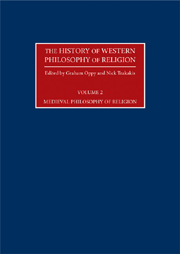Book contents
- Frontmatter
- Contents
- Editorial Introduction
- Contributors
- 1 Medieval Philosophy of Religion: An Introduction
- 2 Boethius
- 3 Johannes Scottus Eriugena
- 4 Al-Farabi
- 5 Avicenna (Ibn Sina)
- 6 Anselm of Canterbury
- 7 Al-Ghazali
- 8 Peter Abelard
- 9 Bernard of Clairvaux
- 10 Averroes (Ibn Rushd)
- 11 Moses Maimonides
- 12 Roger Bacon
- 13 Thomas Aquinas
- 14 John Duns Scotus
- 15 William Ockham
- 16 Gersonides
- 17 John Wyclif
- 18 Nicholas of Cusa
- 19 Erasmus of Rotterdam
- Chronology
- Bibliography
- Index
3 - Johannes Scottus Eriugena
- Frontmatter
- Contents
- Editorial Introduction
- Contributors
- 1 Medieval Philosophy of Religion: An Introduction
- 2 Boethius
- 3 Johannes Scottus Eriugena
- 4 Al-Farabi
- 5 Avicenna (Ibn Sina)
- 6 Anselm of Canterbury
- 7 Al-Ghazali
- 8 Peter Abelard
- 9 Bernard of Clairvaux
- 10 Averroes (Ibn Rushd)
- 11 Moses Maimonides
- 12 Roger Bacon
- 13 Thomas Aquinas
- 14 John Duns Scotus
- 15 William Ockham
- 16 Gersonides
- 17 John Wyclif
- 18 Nicholas of Cusa
- 19 Erasmus of Rotterdam
- Chronology
- Bibliography
- Index
Summary
Johannes (c.800–c.877), known as ‘the Irishman’ (Scottus), who signed one manuscript with ‘Eriugena’, was a Christian Neoplatonist philosopher and theologian of great originality, and an influential transmitter of Greek Christian theology, notably through his translation of Pseudo-Dionysius the Areopagite. Eriugena is the most outstanding philosopher writing in Latin between Boethius and Anselm and the most significant intellectual from early Christian Ireland during an era known for its scholars, many of whom, as Eriugena himself did, became teachers on the European mainland. While Eriugena's work shows traces of his Irish heritage, there is no direct evidence in his writings of the particular form of Christianity that flourished in Ireland at that time.
Eriugena made a number of important contributions to the history of religion in the West. He stands out because of his considerable familiarity with the Greek language, which allowed him direct access to Greek Christian theologians, several hitherto unknown in the Latin West (e.g. Maximus Confessor). Eriugena translated not only the corpus of Dionysius, but also Gregory of Nyssa's treatise on human nature De hominis opificio (On the creation of man) as well as Maximus Confessor's Ambigua ad Iohannem (Difficulties in response to John). In his own treatises, he enthusiastically advocated Dionysius' negative theological approach and generally sided with Eastern Christianity on a number of issues, including on the nature of the processions within the Trinity and on the nature of the resurrection. His dialogue Periphyseon (hereafter Peri.) offers a major synthesis of Greek and Latin Christian theologies and promotes a consistent Christian Neoplatonic system that was influential in later centuries.
- Type
- Chapter
- Information
- The History of Western Philosophy of Religion , pp. 33 - 46Publisher: Acumen PublishingPrint publication year: 2009

